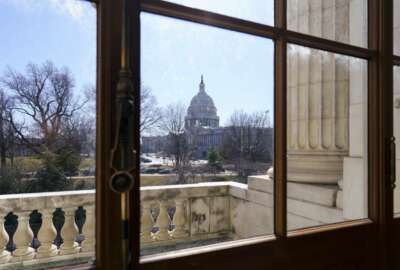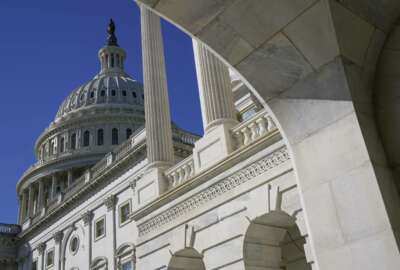OMB warns of hiring freeze, funding gaps, if Congress pursues full-year continuing resolution
The Social Security Administration would have to implement a hiring freeze, while funds for defense and cybersecurity programs would be misaligned if Congress...
Several agencies would lose out on funding needed to address new and emerging priorities if budget stalemates persist for the rest of the year, the Biden administration warned.
OMB on Friday detailed a long list of administration priorities it believes would be under-funded or misaligned in the event Congress can’t pass dedicated, full-year funding for the rest of the fiscal year.
The current continuing resolution, which provided agencies with temporary stop-gap funding needed to avoid a government shutdown at the end of September, expires Dec. 3.
The timeline to secure full-year 2022 funding before the end of the calendar year, much less before the upcoming Dec. 3 deadline, is tight.
The annual defense authorization bill, a bipartisan priority that Congress has passed for six decades straight, is still unfinished. And after months of negotiations, Democrats have yet to pass the Build Back Better Act, another piece of legislation the Biden administration considers a major priority.
Senate Democrats unveiled their funding priorities for the rest of fiscal 2022 last month. The House is farther along in the process, having passed nine appropriations bills for the year along party lines.
“As the next step in the process, the administration looks forward to seeing a proposal from House and Senate Republicans and to bipartisan negotiations with Congress that result in full-year appropriations that benefit the American people,” OMB said in a fact sheet detailing the administration’s budget priorities.
To avoid a government shutdown on Dec. 3, Congress would either have to pass full-year appropriations bills for 2022 or pass another short-term continuing resolution to buy more time before reaching a long-term deal. Lawmakers could also pass a continuing resolution that covers the rest of the fiscal year, an option that Biden administration seems especially eager to avoid.
A full-year continuing resolution, for example, would leave the Social Security Administration short-handed, OMB said.
The Biden administration pitched adding $1.3 billion to the SSA budget for 2022, an amount former agency administrator Andrew Saul previously said was necessary to put customer service initiatives back on track from the pandemic.
“If current funding levels were continued under a full-year CR, the Social Security Administration would likely have to implement a full hiring freeze, leading to an increase in the backlog of disability claims, longer wait times for claimants and increased time to receive assistance through the 1-800 number,” OMB said. “Claimants may have to wait more than six months for a disability determination, nearly 70% longer than the average wait times over the past decade, significantly delaying vital services.”
A full-year continuing resolution would also misalign resources at the Defense Department, OMB warned. It would delay 114 new military construction projects, as an example.
“It would also mean that the 2.7% pay increase the president has proposed for military service members would come at the expense of $2 billion in cuts to the rest of the defense budget,” OMB said.
A full-year continuing resolution would also jeopardize the administration’s cybersecurity initiatives, including ongoing efforts to respond to the SolarWinds attack.
“The size and scale of the incident exceeds existing agency budgetary operations and creates an exigent risk for continuing to delay the deployment of capabilities for response and mitigation of those events,” the fact sheet reads.
The Biden administration said a full-year continuing resolution would make it difficult for the Agriculture Department to ensure the Food Safety and Inspection Service has enough staff working at its meat and poultry plants.
The Centers for Disease Control and Prevention would lose out on an extra $1.6 billion, OMB added. Other health programs, including the Biomedical Advanced Research and Development Authority (BARDA) and Strategic National Stockpile, would lose out on proposed funding bumps.
“Without these additional investments, the CDC would be delayed in rebuilding the nation’s public health infrastructure and workforce; BARDA would not be able to accelerate advanced research and development of vaccines and therapeutics to combat antimicrobial resistance and continuing threats from COVID, as well as future public health challenges; and the SNS would be unable to achieve its stockpiling goals for personal protective equipment and certain medical countermeasures,” the fact sheet reads.
Copyright © 2025 Federal News Network. All rights reserved. This website is not intended for users located within the European Economic Area.
Nicole Ogrysko is a reporter for Federal News Network focusing on the federal workforce and federal pay and benefits.
Follow @nogryskoWFED







